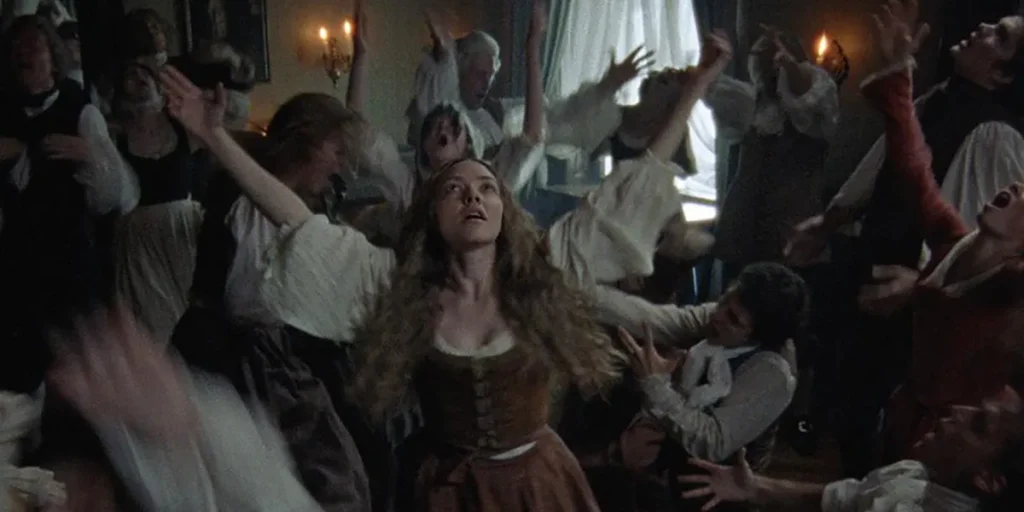Half musical and half historical drama, Mona Fastvold’s The Testament of Ann Lee is an ode to the power of community.
Director: Mona Fastvold
Writers: Mona Fastvold & Brady Corbet
Genre: Biographical, Musical, Historical, Drama
Run Time: 130′
Venice World Premiere: September 1, 2025
U.S. Release Date: TBA
U.K. Release Date: TBA
The Testament of Ann Lee starts with a musical number in a forest as the film introduces us to the woman clothed by the sun that the group has been singing about, the titular Ann Lee (Amanda Seyfried). The film then takes us back to mid-18th-century Manchester, where a young Ann Lee (Millie-Rose Crossley) is growing up with a strong faith in the Christian religion. The film goes on to portray her life as she will become the founder of a radical religious movement called the Shakers, known for ecstatic behaviour and singing during worship, and the second coming of Jesus Christ.
While her accent may at times be unconvincing – the curse of American actors failing to mimic British English properly never quite ends – Seyfried delivers an award-worthy performance as Ann Lee with her layered portrayal of a complex and fascinating woman. The language used is quite archaic, but definitely appropriate for the time: the script of The Testament of Ann Lee pays a lot of attention to its choice of words and to the structure of its sentences. However, this might make it slightly inaccessible to those who are not familiar with a slightly more challenging and less familiar vocabulary.
Shot in 70 mm film and on location in Budapest, The Testament of Ann Lee draws our attention to the environment around the characters through its cinematography. Whether that is the house where the Shakers meet up or the nature that surrounds them for most of the film, such as the forest at the beginning of the movie or the ocean they have to cross to reach New England, it almost becomes a character in and of itself. Thanks to the beautiful visuals and stunning low-key lighting, there are a number of shots in the movie that easily look like an oil painting. Both the cinematography and the costumes immediately bring us back to mid-18th-century England, and later in the film United States and perfectly deliver the setting of the time from the first scene of the film.
For a film that is so focused on religion, it actually does not talk about it that much. Naturally, the themes of faith and beliefs come up time and time again in the movie, but there is never a value statement on religion itself. Fastvold never looks down on the Shakers for their beliefs, but neither does she justify them through their narrative. Instead, The Testament of Ann Lee does not seek to make a judgment on whether Ann Lee actually was the female representation of God, but simply portrays the life of the woman who led the movement and the social context behind it.

Much of the portrayal of the religious group focuses on the community aspect instead. In a time of significant historical change, with the American Revolution happening just as Ann and her followers settle in the soon-to-be United States of America, the Shakers manage to create a sense of unity and community amongst their followers, creating the nuclear family that many, including Ann, might be lacking in their lives. As The Testament of Ann Lee takes us back to Ann’s childhood and upbringing, we can see how the circumstances in her life inspired and prompted many of her religious ideals and the revelations she claims to have received from God himself.
“God must be both male and female,” is what the Shakers are preaching to their followers, arguing that God created man in his image and likeness and, therefore, that must also include women. That was quite a controversial statement at the time, and still remains so today, making the film’s analysis of gender dynamics both in the society of the film and the hierarchy of religious institutions especially fascinating. One of the main struggles that Ann faces in The Testament of Ann Lee is ultimately due to the fact that she is a woman preacher with a significant amount of power within the Shakers movement, and this cannot be accepted in the patriarchal society of the time.
Through the historical figure of Ann Lee, the movie speaks to a specific desire for self-affirmation of women at the time, both in religion and in society. Equally, it portrays the very real situation of the men, like her husband, who are willing to accept this and relinquish the place of dominance afforded to them by the patriarchy. The Testament of Ann Lee is set in the mid of the 18th century, but sadly, this commentary is still very much relevant today, when women often suffer gender-based discrimination in everyday life, let alone those who operate in the Church or in other male-dominated environments.
With its strings and crescendos, the soundtrack, composed by Daniel Blumberg, shows a baroque inspiration that is often associated with church and religious music. The chants become quite repetitive as the film goes on, which also works quite well to convey the religious fervour of the Shakers. The musical elements are quite strong and integrated organically within the movie, especially in the context of the religious movements, as they portray the characters’ inner feelings towards religion and are actively part of the movement’s identifying traits. However, this does not necessarily make The Testament of Ann Lee a musical, or not a traditional one anyway, due to the shortness of the musical numbers and the fact that they do not necessarily drive the plot forward.
Overall, The Testament of Ann Lee is a breath of fresh air thanks to its innovative subject matter and the unique way in which it is filmed. It is a brilliant movie that combines historical drama with biopic, religious films, and musical numbers. On paper, this mix of elements should not technically work, but in Fastvold’s film, it surprisingly does. Despite its potential to be a very divisive movie for the viewers, there is certainly an audience that will appreciate its boldness and originality.
The Testament of Ann Lee: Movie Plot & Recap
Synopsis:
Ann Lee, the founder of the religious movement the Shakers, travels from Manchester to the United States, where she will gain a significant amount of followers.
Pros:
- The analysis of gender dynamics in society and the religious institutions of the time
- The musical numbers are very well integrated and serve the plot of the movie
- The refreshing non-judgmental attitude towards religion.
Cons:
- The use of archaic forms of English might make it harder to understand for a contemporary audience.
The Testament of Ann Lee had its World Premiere at the Venice Film Festival on September 1, 2025. The film will be screened at the BFI London Film Festival in October 2025.

